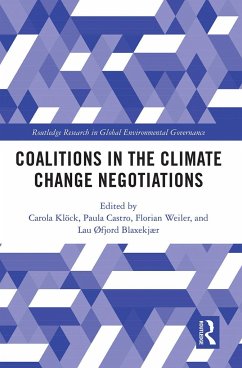This edited volume provides both a broad overview of cooperation patterns in the UNFCCC climate change negotiations and an in-depth analysis of specific coalitions and their relations.
Over the course of three parts, this book maps out and takes stock of patterns of cooperation in the climate change negotiations since their inception in 1995. In Part I, the authors focus on the evolution of coalitions over time, examining why these emerged and how they function. Part II drills deeper into a set of coalitions, particularly "new" political groups that have emerged in the last rounds of negotiations around the Copenhagen Accord and the Paris Agreement. Finally, Part III explores common themes and open questions in coalition research, and provides a comprehensive overview of coalitions in the climate change negotiations.
By taking a broad approach to the study of coalitions in the climate change negotiations, this volume is an essential reference source for researchers, students, and negotiators with an interest in the dynamics of climate negotiations.
Over the course of three parts, this book maps out and takes stock of patterns of cooperation in the climate change negotiations since their inception in 1995. In Part I, the authors focus on the evolution of coalitions over time, examining why these emerged and how they function. Part II drills deeper into a set of coalitions, particularly "new" political groups that have emerged in the last rounds of negotiations around the Copenhagen Accord and the Paris Agreement. Finally, Part III explores common themes and open questions in coalition research, and provides a comprehensive overview of coalitions in the climate change negotiations.
By taking a broad approach to the study of coalitions in the climate change negotiations, this volume is an essential reference source for researchers, students, and negotiators with an interest in the dynamics of climate negotiations.
"This timely book is required reading for all scholars of the international climate change negotiations. With a welcome focus on developing countries, it throws light on the varying dynamics of different coalitions and the critical - often unrecognised - roles they have played at key moments in the climate change process. Both newcomers to the climate change negotiations, and longstanding observers, have much to learn from this important volume." -- Joanna Depledge, Editor of Climate Policy Journal, UK
"Coalitions are a pervasive feature of multilateralism. States use them to increase their bargaining power and reduce the complexity of international negotiations, and, yet, we know surprisingly little of them. This volume fills this gap, by providing a rich collection of in-depth case studies and conceptual work on coalition formation, maintenance, and effectiveness in the international climate change regime. It is an essential read for scholars and students of international relations interested in the role of coalitions in the international climate change regime and beyond." -- Stefan Aykut, University of Hamburg, Germany
"There has been a major gap in the academic literature on the role, formation and operation of coalitions in multilateral negotiations. This volume responds to this research gap by examining coalition dynamics in the climate regime. The complex economic and environmental nature of the climate regime has led to the development of a plethora of shifting coalitions that shape and are shaped by the negotiating dynamics, whether negotiating the Paris Agreement itself of the Paris Rulebook or the second commitment period of the Kyoto Protocol. This volume not only analyzes the different and overlapping coalitions in the climate regime, but it also expands the literature on coalitions and their role in multilateral negotiations." -- Pam Chasek, Manhattan College, USA
"Coalitions are a pervasive feature of multilateralism. States use them to increase their bargaining power and reduce the complexity of international negotiations, and, yet, we know surprisingly little of them. This volume fills this gap, by providing a rich collection of in-depth case studies and conceptual work on coalition formation, maintenance, and effectiveness in the international climate change regime. It is an essential read for scholars and students of international relations interested in the role of coalitions in the international climate change regime and beyond." -- Stefan Aykut, University of Hamburg, Germany
"There has been a major gap in the academic literature on the role, formation and operation of coalitions in multilateral negotiations. This volume responds to this research gap by examining coalition dynamics in the climate regime. The complex economic and environmental nature of the climate regime has led to the development of a plethora of shifting coalitions that shape and are shaped by the negotiating dynamics, whether negotiating the Paris Agreement itself of the Paris Rulebook or the second commitment period of the Kyoto Protocol. This volume not only analyzes the different and overlapping coalitions in the climate regime, but it also expands the literature on coalitions and their role in multilateral negotiations." -- Pam Chasek, Manhattan College, USA

